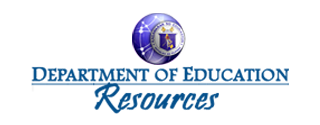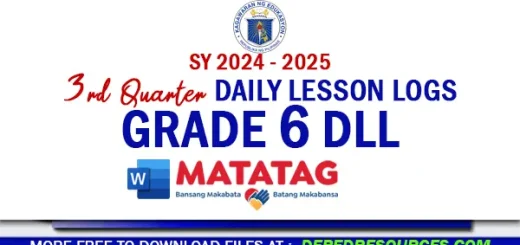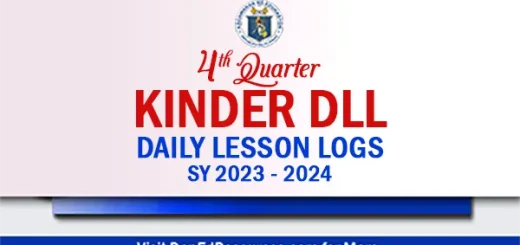Kindergarten Daily Lesson Log – 3rd Quarter DLL – SY 2019 – 2020
We are now on the 3rd Quarter of school year 2019 – 2020! To help you in your lesson preparations, you can now download K to 12 Daily lesson Logs aligned with the current Curriculum Guide for each grade level. Preparing Daily Lesson Logs is very crucial. It consumes a lot of time especially when we lack the required learning materials and teachers guides. Worry no more, we aim to make your work a lot easier. Visit this website regularly to get the latest and updated Daily Lesson Logs. Here you will find the download links for the LATEST Kindergarten Daily Lesson Log – 3rd Quarter DLL – SY 2019 – 2020 .

The Kindergarten Curriculum Framework (KCF) draws from the goals of the K to 12 Philippine Basic Education Curriculum Framework and adopts the general principles of the National Early Learning Framework (NELF). Kindergarten learners need to have a smooth transition to the content-based curriculum of Grades 1 to 12.
The theoretical bases for teaching-learning in the early years, which are founded on constructivism, integrative, thematic, collaborative, inquiry–based, and reflective teaching in play-based approaches with application of the Developmentally Appropriate Practices (DAP); these support the principles of child growth and development, and the learning program development and assessment.
The learning domains have to be nurtured and equally imparted to holistically develop children. It also forms a flower that portrays the gradual unfolding but steady development, as is expected of every child. The child is seen as being in the process of blossoming – like a flower bud whose development should not be forced lest it lose its chance to fully mature. The domains are enclosed by the Learning Areas children will meet in Grade One onward, for which they are being prepared. The Curricular Themes upon which the Kindergarten Curriculum Guide (KCG) or the Teacher’s Guide is designed has been crafted using the thematic or integrative approach to curriculum development in a spiraling learning process. This approach employs integrative and interactive teaching-learning strategies as well as child-centered learning experiences.
THE GENERAL GUIDING PRINCIPLES OF THE NATIONAL EARLY LEARNING FRAMEWORK (NELF)
On Child Growth and Development
- Every child is unique. Growth and development vary from child to child, for whom the first eight years of life are most vital. He/she has an innate desire to learn, and this is best done through meaningful and real experiences.
- Every aspect of growth and development is interrelated and interdependent. The child needs to be nurtured in a good and caring environment that enhances healthy and dependable relationships with other children and most significant adults.
- The learning and development of every child involve a series of complex and dynamic processes that are best attended to in a more positive and responsive manner.
- The child must be encouraged to aspire beyond one’s own level of achievements and to practice newly acquired competencies.
- Every child is a thinking, moving, feeling, and interactive human being able to actively participate in the learning and development of self in the context of one’s family and community, including cultural and religious beliefs.
On Learning Program Development
- The learning program is child centered. It promotes the holistic way by which young children grow and develop,and recognizes the role of families and communities in supporting the child through various stages of growth and development.
- The learning program is appropriate for developing the domains, and must sustain interest in active learning of all young children including those with special abilities, marginalized, and/or those at risk.
- The learning program is implemented by way of diverse learning activities that may be enhanced with multimedia technologies such as interactive radio, audio/video clips, and computer-enhanced activities.
- The use of learning materials and other resources that are locally developed and/or locally available is encouraged. The mother tongue shall be used as the child’s language of learning.
On Learning Assessment
- Assessment is done to monitor learning, know where the child is at, and inform parents of the child’s progress.
- Assessment is crucial to identifying the child’s total developmental needs and does not determine academic achievement.
- Assessment is best conducted on a regular basis so that a timely response or intervention can be made to improve learning.
- The results of the learning assessment of a child shall be kept strictly confidential. Ratings should be more qualitative/descriptive and less numerical.
- The family and community must be informed of the general outcomes of learning so as to encourage further cooperation and partnerships.
- Source:
- Department of Education
3rd Quarter Kindergarten Daily Lesson Log – DLL – SY 2019 – 2020
- New! KINDERGARTEN Daily Lesson Log – Quarter 3: Week 1
- October 28 – November 1, 2019
- New! KINDERGARTEN Daily Lesson Log – Quarter 3: Week 2
- November 4 – 8, 2019
- New! KINDERGARTEN Daily Lesson Log – Quarter 3: Week 3
- November 11 – 15, 2019
- New! KINDERGARTEN Daily Lesson Log – Quarter 3: Week 4
- November 18 – 22, 2019
- New! KINDERGARTEN Daily Lesson Log – Quarter 3: Week 5
- November 25 – 29, 2019
- New! KINDERGARTEN Daily Lesson Log – Quarter 3: Week 6
- December 2 – 6, 2019
- New! KINDERGARTEN Daily Lesson Log – Quarter 3: Week 7
- December 9 – 13, 2019
- New! KINDERGARTEN Daily Lesson Log – Quarter 3: Week 8
- New! KINDERGARTEN Daily Lesson Log – Quarter 3: Week 9
- January 6 – 10, 2019
- New! KINDERGARTEN Daily Lesson Log – Quarter 3: Week 10
- January 13 – 17, 2019
MORE Kindergarten Daily Lesson Logs
1st Quarter Kindergarten DLL’s
2nd Quarter Kindergarten DLL’s
These daily lesson log were made in compliance with the Department of Education format.
DepEd Resources credits these files to all the owners and authors as well as those who sent us this files for posting. We will always be thankful of you. You make DepEd Resources possible for our beloved teachers .
Please visit our website from time to time for new and unannounced additional uploads.
Additional DLLs to be uploaded SOON!
Thank you.
You may also request for specific files in our Facebook Page.
Don’t forget to LIKE our Page!
Click Here.
Please LIKE and SHARE so everyone would benefit from these files. Thank you!
LIKE US on Facebook! Click Here.
“I cannot do all the good that the world needs. But the world needs all the good that I can do.”
―
 Learn about the information we collect and how it's used.
Learn about the information we collect and how it's used. Discover how we protect your data.
Discover how we protect your data. Understand your rights and choices regarding your personal information.
Understand your rights and choices regarding your personal information.














